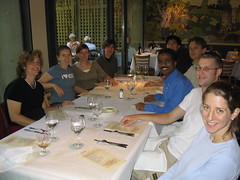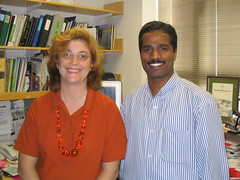During Madhu's last week in lab, we had the traditional five days of celebration:
Day 1: Tawkindalab is the first day of celebration. This day is meant for reflection on the time spent in a particular place. The traveler is required to discuss his experiences and accomplishments in a formal presentation to his friends and family. This is usually accompanied by a small feast of donuts, muffins, bagels, and cream cheese. (Dunkin' Donuts has a special package-- just ask for the Tawkindalab box.)
Day 2: The second day, known as Freezayeesties, is the day of organization. The traveler groups the items he has collected or created during his stay and record their existence for posterity. Traditionally, this is done by taking a small sample of each, placing it in a small well-labeled tube, and placing it in cold storage.
Day 3: Taggasail is the most difficult day of celebration, because it requires the traveler to decide which of his belongings he will take on his journey, and which to leave. Instead of giving away the unwanted items, however, he sells them to friends, family, or perfect strangers who happen to be walking by. Not only does this relieve him of the burden of material objects, but it provides some travel money with which to buy postcards for the people he will soon leave behind.
Day 4: On Taekdabenchy, the traveler is required to remove the remainder of his personal belongings from the space he inhabited during his stay. This is terribly sad for his friends and family, who typically respond by first collecting the items he leaves behind (as a sort of keepsake or memento), and then placing their own items in the empty space.
Day 5: Eetalotafeud, the final day of celebration, is the day of feasting. Originally intended to prepare the traveler for the long journey ahead (during which there may not be enough food available to sustain the high amount of energy required in travel), Eetalotafeud consists of one continuous meal that lasts the entire day. In addition, the friends and family of the traveler must accompany him in the feasting, as a symbol of their desire to spiritually travel with him. Here we are early in the day of feasting. (You can tell because we aren't yet bloated from the huge amounts of food.)

Madhu added his own contribution to the traditional week of celebration, which he called Maika-dapee-ayekrai. Drawing on the traditional Guru Purnima festival, he told us how the parents and teacher are respected and revered as deities, because they remove one's ignorance. It says, "Gurubrahma Guruvishnu Gururdevo Maheshwaraha”: The guru is Brahma, Vishnu and Mahesh (Shiva). Also, "Matru Devo Bhava, Pitru Devo Bhava, Acharya Devo Bhava, Atithi Devo Bhava": Revere your mother, father, preceptor and guest as God. He also cited the Hindu axiom that says, "A river cannot be clean if the source is polluted." Like a river, the quality of the lab depends on the quality of our mentor, and because Susan is happy, the rest of the lab is happy. And clean.

No comments:
Post a Comment